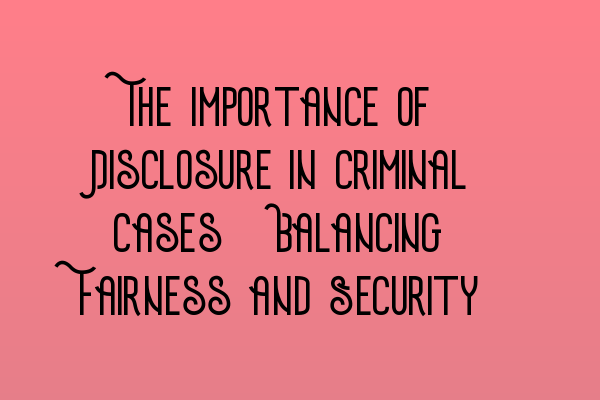The Importance of Disclosure in Criminal Cases: Balancing Fairness and Security
Criminal cases are complex and require a careful balance between ensuring fairness for the accused and maintaining the security of the wider society. One crucial aspect of this balance is the disclosure process, whereby the prosecution is required to provide all relevant evidence to the defence.
Disclosure is a fundamental principle of criminal law that aims to guarantee a fair trial and the right to a proper defence. It allows the defence to prepare adequately, assess the strength of the prosecution’s case, and identify any weaknesses or inconsistencies in the evidence. Failure to disclose relevant evidence can lead to miscarriages of justice and wrongful convictions.
In recent years, disclosure failures have garnered significant attention, as high-profile cases have uncovered serious shortcomings in the way evidence is disclosed. These failures have highlighted the need for a robust and transparent system that ensures both sides of the case have access to all relevant information.
The Challenges of Disclosure
The digital age has added complexities to the disclosure process. The volume and variety of electronic data have increased exponentially, making it challenging for prosecutors to sift through and provide all relevant information to the defence. Additionally, issues relating to data protection, privacy, and national security further complicate the disclosure process.
To address these challenges, legal professionals must stay up to date with technological advancements and adopt innovative solutions to handle vast amounts of data efficiently. The use of specialized software and tools, along with the expertise of digital forensic experts, is becoming increasingly crucial in managing and analyzing digital evidence.
The Consequences of Inadequate Disclosure
Inadequate disclosure can have severe consequences for all parties involved. Incomplete or delayed disclosure jeopardizes the fairness of the trial and undermines public confidence in the criminal justice system. It can also lead to unnecessary delays in proceedings and wasted resources.
For defendants, inadequate disclosure can significantly impair their ability to mount a strong defence and challenge the prosecution’s case effectively. Without access to all relevant evidence, defendants may be caught off guard during cross-examination or miss opportunities to discredit the prosecution’s witnesses or evidence. This can have life-changing repercussions for individuals facing criminal charges.
Improving the Disclosure Process
Recognizing the importance of disclosure, legal authorities and policymakers have taken steps to improve the process. The Solicitors Qualifying Examination (SQE) now includes specific modules on criminal law and practice, emphasizing the significance of disclosure and its implications for criminal cases.
Law firms and legal professionals also play a critical role in enhancing the disclosure process. Ensuring that solicitors and lawyers receive comprehensive training in disclosure practices enables them to handle cases effectively, identify disclosure issues, and request the necessary evidence to build a robust defence.
Furthermore, utilizing technology and digital solutions can streamline the disclosure process, enabling prosecutors to manage and organize vast amounts of data more efficiently. This helps ensure all relevant evidence is promptly identified, reviewed, and provided to the defence, thereby minimizing the risk of incomplete disclosure.
The Balancing Act: Fairness vs Security
While disclosure is essential for a fair trial, the need to balance fairness with national security must also be considered. Certain information, particularly sensitive intelligence, may need to be withheld to protect individuals or preserve ongoing investigations.
Balancing fairness and security requires a delicate approach, where legal professionals must carefully navigate the complexities of national security concerns while still upholding the defendant’s right to a fair trial. This delicate balance is essential to maintain public trust in the criminal justice system and prevent any potential abuse of power.
Overall, the importance of disclosure in criminal cases cannot be understated. It is a critical element in ensuring fairness, safeguarding individuals’ rights, and maintaining public confidence in the criminal justice system. By continuously improving disclosure practices, utilizing technology, and prioritizing comprehensive training, legal professionals can contribute to a just and effective criminal justice system.
For more information on SQE preparation and practice exams, please check out the following articles:
